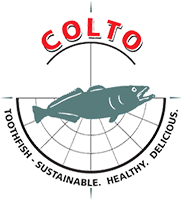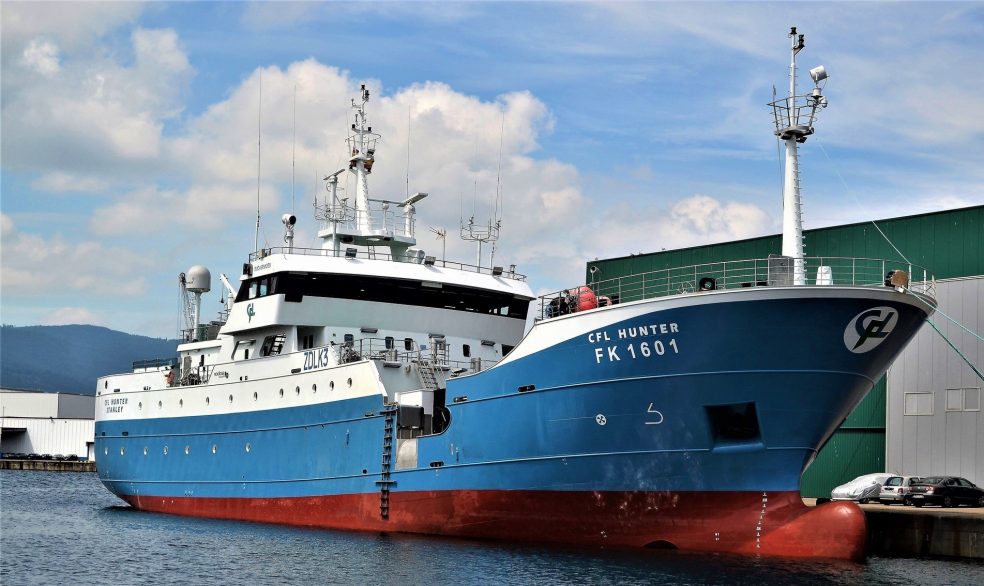Consolidated Fisheries Limited (CFL) is leading a landmark research project into the impact of longline fishing on benthic habitats in their goal to ensure the continued sustainability of their fishing practices in Falklands waters.
As a toothfish fishing company with Marine Stewardship Council (MSC) certification since 2014, CFL has strengthened its commitment to meeting the highest environmental standards in its fishing practices.
To this end, the company funded SAERI to identify, study and map vulnerable marine ecosystems (VMEs) below 600 meters water depth to determine the impact of longline fishing.
Post-doctoral researcher Dr Tabitha Pearman, a deep-sea marine ecologist who specializes in deep-sea habitat mapping, was employed by SAERI to lead this work.
VMEs represent important groups of species, communities, or habitats that may be vulnerable to the impacts of fishing activities and which may result in significant adverse impacts to ecosystem integrity. Examples of such species include previously understudied cold-water fragile corals, sponges, sea pens, and unique species that inhabit other rare and novel habitats of the Falklands deep-sea. These complex and diverse assemblages support a much wider ecosystem of deep-sea species, including toothfish and research into VMEs are now global importance.
This research is a collaboration between CFL, the FIG Fisheries Department and SAERI, and follows on from work carried out by Dr Paul Brewin (SAERI) in 2017, who recommended an urgent, better understanding of VMEs in the Falklands and the impact on them.
Due to the difficulty involved with collecting data from the deep-sea, Dr Pearman will be utilising a specially adapted deepwater camera that will be attached to the longline, by catch samples and previous data sets to create maps of the VMEs, which will help us understand the location of these areas and how they’re connected.
Currently, there is uncertainty as to whether the longlines themselves, the weights that they’re dropped with, or the net umbrellas that shield the hooks, have the greatest impact. Although CFL’s longliner, the CFL Hunter, utilizes a system that is believed to have minimal impact on the seabed, it is essential that a full understanding of the nature and extent of the fishing’s impact are properly assessed so that strategies for mitigating impacts on VMEs and the benthic environment they form part of can be developed.
Very little research into these types of impacts have previously been done globally, and the findings of this particular project will not only be significant for the Falklands longline industry in helping to protect VMEs and the local ecosystem, but will provide a basic framework and knowledge set that will benefit environmental protection globally.
Dr. Tabitha Pearman, Vulnerable Marine Ecosystems Project Lead, said: “Throughout my professional life I have been keen to work in the Falkland Islands and when the opportunity to take on a project on a very unknown area of marine ecology arose, I jumped at the chance of this first trip on the CFL Hunter as an exciting opportunity to explore the deep sea of the Southern Ocean and observe new, unknown species.
“The initial work has already proven useful by revealing the variety of habitats occurring in Falkland deep-sea waters and has shown how significant this research will be, not only for changing the understanding of VME’s and longlining impacts, but also on the methodology.
“There is currently very little data on how to conduct research on the impacts of longliners on VMEs, so this whole project is a fantastic insight into how you can work collaboratively with fisheries and a longline vessel, to manage this challenging and interesting research. I look forward to spending the next two years working with CFL, SAERI and FIG to bring this project to fruition.”
General Manager Consolidated Fisheries LtdJanet Robertson said: “As holders of 100% of the Falkland Islands’ toothfish fishing quota since 2006, we’ve long been dedicated to ensuring both the economic and environmental sustainability of the fishery.
“There is a significant gap in the knowledge worldwide of the impacts of longlining on vulnerable marine ecosystems and this project will both ensure CFL’s continued commitment to high standards under Marine Stewardship Council certification and will put the Falklands fishing industry at the global forefront in terms of environmental research and development within the industry.”
-from MercoPress

